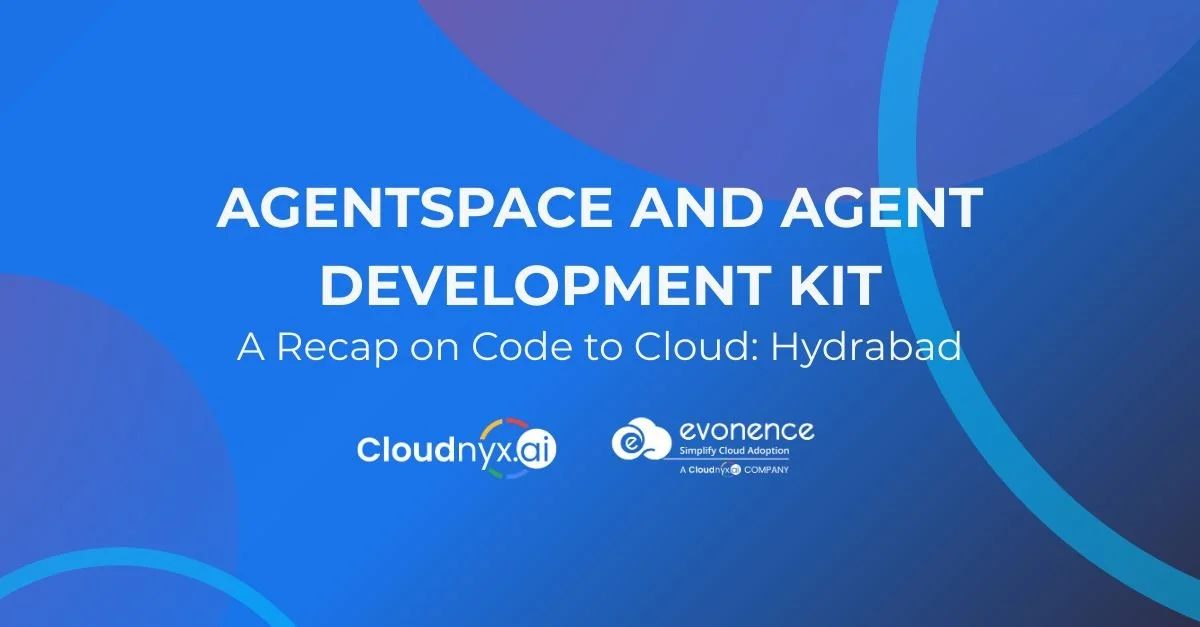Shaping the Future of Work with Agentic AI: Agentspace and ADK in Action
This past Saturday, Evonence, a Cloudnyx.ai company, hosted an engaging engineering meetup at DevX, HITEC City, Hyderabad. The session brought together developers, architects, and AI practitioners to explore how enterprises can build with Google Agentspace and the Agent Development Kit (ADK), tools shaping how AI agents are transforming the way organizations operate.
Our speakers, Pramod Parmeshwaran (Delivery Head, Evonence), Tushar Patil (Google Cloud Data Engineer, Evonence), and Masiyuddin Khan (AI/ML Developer, Evonence), shared practical insights on designing, deploying, and scaling AI agents for real business impact.
Moving from AI Experiments to Enterprise Agents
Many companies today have tested AI models or proof-of-concepts, but few have been able to integrate them into business-critical workflows. As Pramod highlighted, the challenge isn’t just building AI, it’s making AI usable, secure, and impactful across the enterprise.
That’s where Agentspace comes in. Positioned as “to the enterprise what the browser is to the web,” Agentspace provides a single platform for building, managing, and scaling AI agents. The platform unifies search, reasoning, and action, making it easier for enterprises to move beyond experiments and into production-grade adoption.
Why Pipelines Still Matter: Agents in Context
Tushar walked the audience through how connectors, knowledge graphs, and actions form the backbone of Agentspace. Just like in predictive systems where pipelines matter more than individual models, in enterprise AI it’s the ecosystem of agents and integrations that creates value.
Some practical takeaways:
Connectors link enterprise systems like SharePoint, Salesforce, and ServiceNow to Agentspace, enabling agentic search.
Knowledge Graphs unify and contextualize data for more intelligent responses.
Actions allow agents to not just analyze but also take steps, like updating Jira, scheduling meetings, or generating reports.
This end-to-end view ensures that agents can work reliably across departments, whether in sales, HR, IT, or procurement.
Balancing Innovation with Governance
Masiyuddin addressed one of the most pressing concerns: how to innovate with agents without compromising security and compliance.
Key practices discussed included:
Role-based access control and VPC Service Controls to protect sensitive data.
Context-aware access and IAM policies for fine-grained user governance.
Audit logs and access transparency for enterprise-grade accountability.
His takeaway was clear: enterprises should design agents with the same rigor they apply to other mission-critical systems. Security cannot be an afterthought in the agentic era.
Community Conversations: Where Agents Deliver Value
The Q&A sparked great discussions on practical use cases. Participants were particularly interested in:
Talent Acquisition: automating candidate sourcing, screening, and scheduling with AI agents.
Marketing: brainstorming and ranking campaign ideas with data-driven insights.
Operations: reducing cycle times by automating approval workflows and reporting.
No matter the function, the underlying theme was the same: AI agents should amplify individual impact while delivering measurable ROI.
Looking Ahead
The Hyderabad meetup reinforced why conversations like these are critical. As enterprises experiment with generative AI, the focus is shifting to agentic platforms that can orchestrate real workflows, integrate with enterprise systems, and deliver business outcomes.
At Evonence, we see Agentspace and ADK as foundational tools for enterprises ready to embrace this shift. The future of work is agentic, and it’s already here.
If you couldn’t join us in person, we hope this recap gives you a sense of what we covered. We’d love to hear how your teams are exploring AI agents. Connect with us at Evonence (part of Cloudnyx) to continue the conversation.

